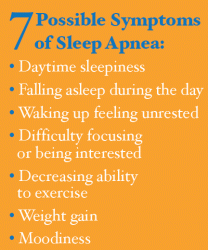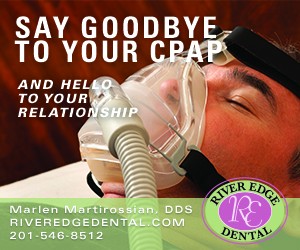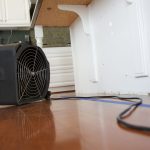Could Your Spouse’s Snoring Be…Deadly?
 One of my all-time favorite movie scenes is in “The War of the Roses.” Kathleen Turner rolls over in bed and stares down at her slumbering husband, Michael Douglas, as he sleeps–and snores–contentedly next to her. She smirks and then casually leans over, and clamps his nostrils shut with her fingers until he wakes up shocked and gasping for air. I’ve spent many a night fantasizing about doing the same to my husband. This is not the type of late night fantasy I expected I would have about my husband when we were first married. But as time goes on, one of the things I fantasize most about, sadly, is uninterrupted sleep!
One of my all-time favorite movie scenes is in “The War of the Roses.” Kathleen Turner rolls over in bed and stares down at her slumbering husband, Michael Douglas, as he sleeps–and snores–contentedly next to her. She smirks and then casually leans over, and clamps his nostrils shut with her fingers until he wakes up shocked and gasping for air. I’ve spent many a night fantasizing about doing the same to my husband. This is not the type of late night fantasy I expected I would have about my husband when we were first married. But as time goes on, one of the things I fantasize most about, sadly, is uninterrupted sleep!
Unfortunately, most nights, I lay in bed, wide awake, actually bubbling with anger because while my husband is in a deep sleep snoring away, I am losing precious shut-eye. My gaze shifts between staring at the clock and calculating how many hours (or sometimes minutes) of sleep I will get if I fall asleep RIGHT NOW. My shoulder taps and nudges become more aggressive until, sometimes, I admit, I try the clamping of the nose technique. Yes, this is an ugly, violent side of me that rears its ugly head when I am sleep-deprived. I start my morning groggy and tired an listen incredulously as my husband complains about how tired he feels and how he doesn’t feel like he slept a wink.
Recently, his rhythmic snoring began to change. Between rhythmic snores, there were actually spurts of silence…sometimes, long periods of silence. At first, I was relieved thinking this is my chance to sleep. Don’t wake the a sleeping baby…or spouse; just appreciate it. But then, he would gasp for air again, startling me back to my alert state. I realized that it wasn’t that he had stopped snoring. It was that he had stopped breathing! In the morning, I started googling articles about snoring and realized that my husband might actually have sleep apnea, a potentially serious, even deadly, condition. After doing a little reading, it all made sense. My husband would complain that he was tired even though it appeared that he’d gotten 7 hours of sleep. People with sleep apnea may lay in bed for 7 or 8 hours, but the restless sleep that they get leaves them feeling like they were up all night.
Sleep apnea is very common and very treatable but about 80% of people with sleep apnea go undiagnosed and don’t know they need treatment. Left untreated, it may lead to a heart attack, complications from diabetes, or even a fatal car accident. It may also be linked to Alzheimer’s disease.
Fortunately there are many good treatment options so that no one has to suffer the increased risks. The only problem is that perhaps 80% of people with sleep apnea are undiagnosed and don’t know they need treatment. Part of the reason why so many people with sleep apnea don’t know they have it is that many of the signs and symptoms are hard to notice. One of the most common signs, snoring, is often dismissed as just a nuisance. Below are 7 possible symptoms of sleep apnea.

But what is sleep apnea, that it is associated with so many symptoms and medical conditions? Sleep apnea, is, very simply, when your breathing stops at night. There are two main types of sleep apnea: obstructive and central.
Obstructive sleep apnea occurs when your airway physically closes at night. It’s a worsening of the airway narrowing that can cause snoring. When your airway completely closes, your breathing is cut off, and your brain has to awaken slightly to open your airway and resume breathing. Your body also has a typical response to suffocating. Your heart works harder to pump more blood to supply your brain with as much oxygen as possible, which is how sleep apnea leads to high blood pressure and damages your heart and blood vessels.
During central sleep apnea, the second type, your brain just doesn’t send signals to tell your body to breathe. This can develop independently, related to a developmental defect or brain injury, or sometimes it’s a complication of CPAP.
People can have both types of sleep apnea at the same time. Sometimes this is described as a third type, called mixed or complex sleep apnea.
Sleep is essential to your body’s regulatory mechanisms. When your sleep is being interrupted dozens or even hundreds of times a night, you may never reach the levels of sleep necessary to reset your body’s regulation of energy usage, which is why you may gain weight and develop diabetes. And because your sleep has an essentially restorative function for your mind, you may experience cognitive and emotional problems, such as memory loss, difficulty thinking, and difficulty regulating your moods.
If you think you might have sleep apnea, it’s best to see a medical professional. Treatment can ease your symptoms and may help prevent heart problems and other complications, not to mention, help your marriage.
Many people don’t think of snoring as a sign of something potentially serious, and not everyone who has sleep apnea snores. Discuss if you are experiencing loud snoring, especially snoring that’s punctuated by periods of silence.
Here are some signs that it’s time to get a opinion:
- Snoring loud enough that you disturb the sleep of yourself or others (like your wife!)
- Waking up feeling shortness of breath, gasping for air or choking.
- Intermittent pauses in your breathing during sleep
- Excessive daytime drowsiness, which may cause you to fall asleep while you’re working, watching television or even driving
After hearing these symptoms, a sleep specialist will decide if you need further evaluation. This could involve an overnight monitoring of your breathing and other body functions during sleep. During a Nocturnal polysomnography test, you’re hooked up to equipment that monitors your heart, lung and brain activity, breathing patterns, arm and leg movements, and blood oxygen levels while you sleep. If the results are abnormal, your doctor may be able to prescribe a therapy without further testing.
Sleep apnea treatments are focused on ensuring that your airway stays open. The most commonly prescribed treatment is CPAP (Continuous positive airway pressure). CPAP forces air into your lungs to ensure that your airway stays open and that even if your body doesn’t breathe you still have air.
Many people find CPAP uncomfortable and hard to use, so they look for a CPAP alternative. Oral appliance therapy works by repositioning your jaw — which supports the tissues of your airway — so that your airway stays open. It only works on obstructive sleep apnea.
Sleep apnea surgery is sometimes recommended, too, although the success rate of surgery is less than ideal, and there is a higher risk of complications.
My husband now sleeps with the CPAP machine. He isn’t always keen to put it on—and it’s not the sexiest look –but it has improved the way that he feels…and mine!




















